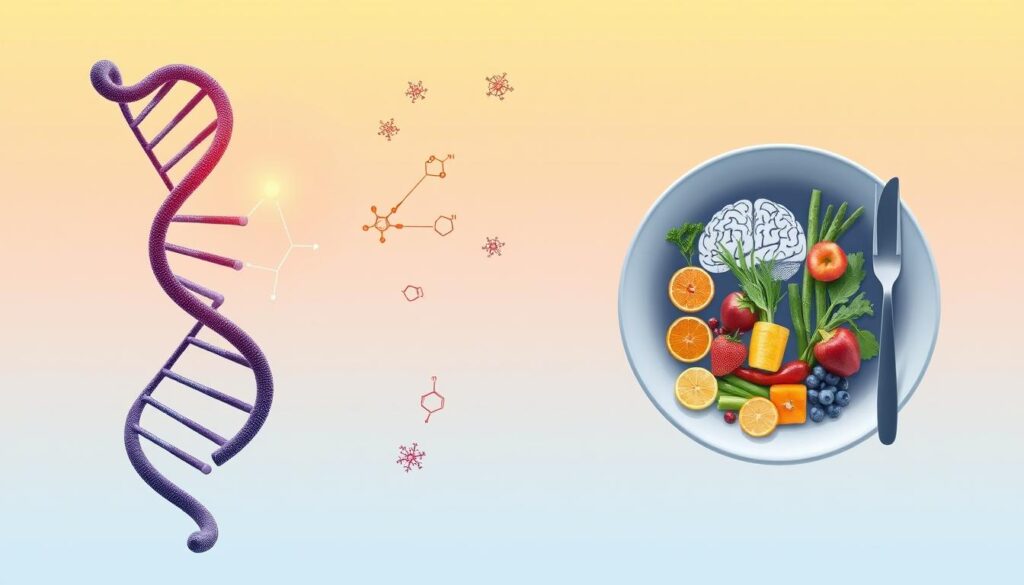Phenylketonuria (PKU) is a rare inherited metabolic disease. It affects how your body processes phenylalanine, an essential amino acid. Newborns are routinely screened for PKU to ensure early detection12.
PKU impacts protein metabolism in about 1 in 25,000 newborns. The body can’t break down phenylalanine properly, leading to serious health risks. Understanding PKU helps families manage the disorder effectively21.
Early detection of PKU is crucial. All 50 states require newborn screening to identify the disorder quickly. This allows healthcare professionals to develop appropriate treatment strategies2.
With proper management, people with PKU can lead healthy, productive lives. This involves careful diet control and regular medical care.
Key Takeaways
- PKU is a rare genetic disorder affecting phenylalanine metabolism
- Newborn screening is critical for early PKU detection
- Proper management can prevent serious health complications
- PKU is more common in people of European ancestry
- Genetic inheritance plays a significant role in PKU development
What is Phenylketonuria (PKU) and Its Causes
Phenylketonuria (PKU) is a rare genetic disorder affecting amino acid processing. It results from an enzyme deficiency that disrupts normal metabolism. This condition impacts how the body handles crucial amino acids1.
The Genetic Nature of PKU
PKU is inherited when both parents carry an altered phenylalanine hydroxylase (PAH) gene. A child has a 25% chance of developing PKU if both parents are carriers2.
This genetic variation prevents the body from breaking down phenylalanine effectively. PKU occurs in 1 in 25,000 newborns in the United States12.
- Occurs in 1 in 25,000 newborns in the United States2
- Requires both parents to carry the genetic mutation
- More common in people of European descent
How PKU Affects the Body
Without proper enzyme function, phenylalanine builds up to toxic levels. This accumulation can cause severe complications in the body. It particularly affects brain development and neurological functions1.
Risk Factors and Inheritance Patterns
Newborn screening helps detect PKU early, allowing for prompt treatment. Early detection reduces the likelihood of severe symptoms2. Untreated PKU can lead to intellectual disability and developmental challenges1.
Early detection and management are crucial for individuals with PKU.
Genetic counseling helps families understand their risk and inheritance patterns. It provides insights into managing this complex metabolic disorder. Knowing your genetic makeup is key to handling PKU effectively1.
Signs, Symptoms, and Early Detection of PKU
Early detection of phenylketonuria (PKU) is vital to prevent long-term health issues. Newborn screening helps identify this genetic condition before symptoms appear3. PKU affects about one in 12,000 births, making thorough screening crucial3.
Newborns with PKU often show no immediate signs. Without treatment, symptoms can develop within months. These may include musty body odor, lighter skin and hair, and eczema.
Other potential symptoms are seizures and developmental delays. Early intervention is key to preventing these issues.
- Musty body odor
- Lighter skin and hair
- Eczema
- Potential seizures
- Developmental delays
Managing PKU requires a strict low protein diet early in life. This approach helps prevent intellectual disabilities and neurological problems4. Experts recommend a team of specialists for comprehensive care3.
Early detection through newborn screening can dramatically improve a child’s long-term health outcomes.
Parents should know about dietary restrictions for those with PKU. These include avoiding high-protein foods and eliminating aspartame from the diet4.
- Avoiding high-protein foods like milk, cheese, and meats4
- Eliminating aspartame from the diet4
- Using special medical formulas to ensure proper nutrient intake4
Pregnant women with PKU need strict dietary management. This helps prevent complications like low birth weight and heart problems in babies3.
The FDA has approved sapropterin dihydrochloride (Kuvan) for treating PKU. Researchers are exploring new therapies like enzyme replacement and gene therapy4.
Conclusion
Managing PKU requires lifelong dedication and a comprehensive approach. Early detection and consistent medical intervention are crucial. Timely dietary treatment prevents serious complications, allowing you to lead a vibrant life5.
Successful PKU management relies on strict dietary control. Working closely with a healthcare team is essential. Regular monitoring of phenylalanine levels is key to this process.
Patients must keep blood Phe levels between 120-360 umol/L6. Diet compliance can be challenging, especially as you age. However, proper support and education can help overcome these obstacles.
Careful management leads to remarkable outcomes for individuals with PKU. It minimizes potential developmental impacts. Genetic counseling helps in understanding your condition and family planning.
PKU management isn’t just about medical treatment. It’s about embracing a holistic approach to health. Support from healthcare professionals and family makes a significant difference.
Remember, PKU is manageable. With the right approach, you can thrive and reach your full potential. Specialized PKU support groups can provide additional assistance and encouragement.
FAQ
What is Phenylketonuria (PKU)?
How common is PKU?
How is PKU diagnosed?
What are the symptoms of PKU?
How is PKU treated?
Can people with PKU lead normal lives?
Is genetic counseling recommended for PKU?
What complications can occur with PKU?
Source Links
- Phenylketonuria (PKU) – Symptoms and causes – https://www.mayoclinic.org/diseases-conditions/phenylketonuria/symptoms-causes/syc-20376302
- Phenylketonuria: MedlinePlus Genetics – https://medlineplus.gov/genetics/condition/phenylketonuria/
- Newborn Screening Program – Phenylketonuria – http://www.idph.state.il.us/healthwellness/fs/pku.htm
- Eunice Kennedy Shriver National Institute of Child Health and Human Development – https://www.nichd.nih.gov/health/topics/factsheets/pku
- Phenylketonuria: An Inborn Error of Phenylalanine Metabolism – https://pmc.ncbi.nlm.nih.gov/articles/PMC2423317/
- Phenylketonuria: nutritional advances and challenges – Nutrition & Metabolism – https://nutritionandmetabolism.biomedcentral.com/articles/10.1186/1743-7075-9-7
